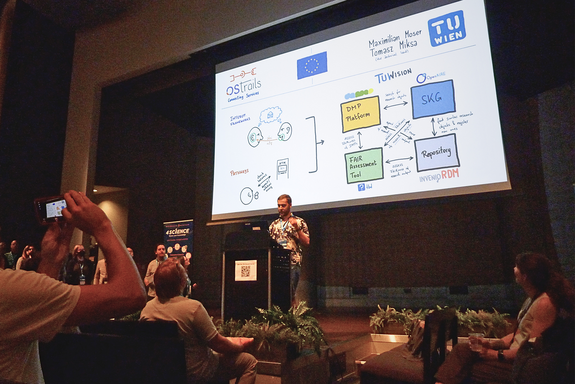This year's Open Repositories Conference in Chicago, opens an external URL in a new window (IL) marked the 20th anniversary of Open Repositories. Fitting the occasion, the conference's overarching topic was "20 Years of Progress, a Future of Possibilities".
The sessions were largely oriented along this topic: Many presentations covered past experiences and learnings taken from them, while others were anticipating the future.
Preservation of research output
There were discussions about curation of digital content and its preservation into the future, e.g. on the storage level via OCFL. Reportedly, version 2 of OCFL is currently work in progress, which should make it easier to be used in InvenioRDM with its record versioning model. For the subset of research output that is research software (as opposed to software in research), Software Heritage, opens an external URL in a new window has proven to be a popular choice for digital preservation.
Current events
Even though the overarching topic only mentioned the past and the future, the present was, of course, another important area of interest. Especially the impact of current political developments on science in general, and the challenges that AI and crawler bots pose for repositories. Of course, not everything was as gloomy, and some good use cases for AI in repositories (like for enhanced search capabilities) were also discussed.
COAR Notify
As seems to be tradition for the Open Repositories by now, the COAR Notify protocol made several appearances as well. This time, however, it was discussed more as an imminent reality, rather than as an upcoming/distant vision as previously. Several platforms (like DSpace) already have support built in, and work for InvenioRDM is also nearing the finish line. While the feature didn't make the race for the v13 feature freeze, Cottage Labs are dedicated to make it a part of the next minor release.
TU Wien contributions
This year's official attendee from TU Wien was Max Moser with a poster, a presentation, and also a spot in this year's conference committee!
In the InvenioRDM workshop on Sunday, Max gave an overview of our institutional repository, TU Wien Research Data, opens an external URL in a new window. This presentation covered the repository's history, its existing customisations, and its latest developments. Of particular interest to the audience were the handling of large deposits (including backups), the built-in curation workflow, and our future plans about digital preservation.
The poster went beyond the limits of TU Wien, presenting the outlines of the OSTrails project, opens an external URL in a new window, which strives for more standardised communication between different types of research support systems. At this point, Suvini Lai also joined the conference (although less officially), clarifying some key aspects of the project for interested visitors of the poster.
Until next year
Perhaps also in line with the conference's topic of "a future of possibilities", next year's location was revealed to be... Online! While, of course, this was a bit of a controversial decision, it was certainly a brave one. It has the potential to make the conference more accessible to the global community, with reduced registration fees and immediately available session recordings. Either way, we're already excited to see how it turns out!
Contact
TU Wien
Centre for Research Data Management
Favoritenstraße 16 (top floor)
1040 Vienna
